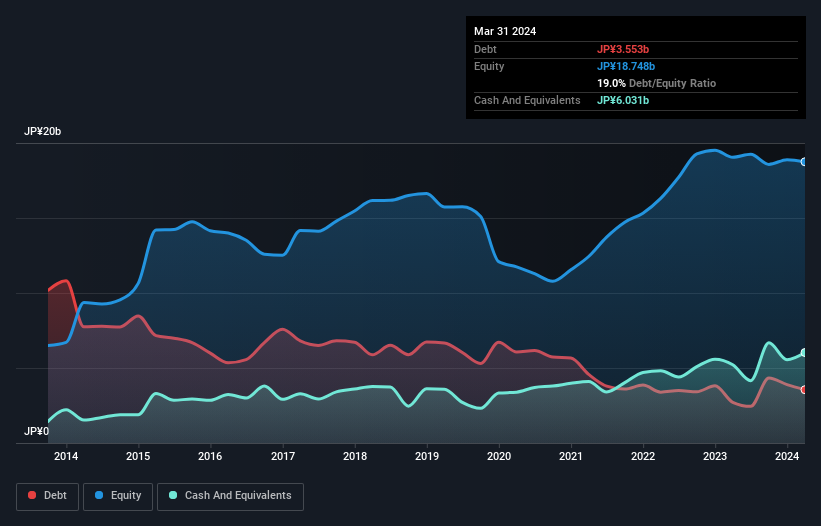
Warren Buffett famously said, 'Volatility is far from synonymous with risk.' It's only natural to consider a company's balance sheet when you examine how risky it is, since debt is often involved when a business collapses. As with many other companies Punch Industry Co., Ltd. (TSE:6165) makes use of debt. But is this debt a concern to shareholders?
When Is Debt Dangerous?
Debt is a tool to help businesses grow, but if a business is incapable of paying off its lenders, then it exists at their mercy. If things get really bad, the lenders can take control of the business. However, a more usual (but still expensive) situation is where a company must dilute shareholders at a cheap share price simply to get debt under control. By replacing dilution, though, debt can be an extremely good tool for businesses that need capital to invest in growth at high rates of return. The first thing to do when considering how much debt a business uses is to look at its cash and debt together.
View our latest analysis for Punch Industry
What Is Punch Industry's Debt?
You can click the graphic below for the historical numbers, but it shows that as of March 2024 Punch Industry had JP¥3.55b of debt, an increase on JP¥2.71b, over one year. However, its balance sheet shows it holds JP¥6.03b in cash, so it actually has JP¥2.48b net cash.

A Look At Punch Industry's Liabilities
According to the last reported balance sheet, Punch Industry had liabilities of JP¥7.61b due within 12 months, and liabilities of JP¥3.30b due beyond 12 months. Offsetting these obligations, it had cash of JP¥6.03b as well as receivables valued at JP¥10.9b due within 12 months. So it actually has JP¥6.07b more liquid assets than total liabilities.
This surplus strongly suggests that Punch Industry has a rock-solid balance sheet (and the debt is of no concern whatsoever). On this view, lenders should feel as safe as the beloved of a black-belt karate master. Succinctly put, Punch Industry boasts net cash, so it's fair to say it does not have a heavy debt load!
In fact Punch Industry's saving grace is its low debt levels, because its EBIT has tanked 49% in the last twelve months. When it comes to paying off debt, falling earnings are no more useful than sugary sodas are for your health. The balance sheet is clearly the area to focus on when you are analysing debt. But you can't view debt in total isolation; since Punch Industry will need earnings to service that debt. So when considering debt, it's definitely worth looking at the earnings trend. Click here for an interactive snapshot.
Finally, a company can only pay off debt with cold hard cash, not accounting profits. While Punch Industry has net cash on its balance sheet, it's still worth taking a look at its ability to convert earnings before interest and tax (EBIT) to free cash flow, to help us understand how quickly it is building (or eroding) that cash balance. During the last three years, Punch Industry produced sturdy free cash flow equating to 52% of its EBIT, about what we'd expect. This free cash flow puts the company in a good position to pay down debt, when appropriate.
Summing Up
While it is always sensible to investigate a company's debt, in this case Punch Industry has JP¥2.48b in net cash and a decent-looking balance sheet. So is Punch Industry's debt a risk? It doesn't seem so to us. There's no doubt that we learn most about debt from the balance sheet. However, not all investment risk resides within the balance sheet - far from it. To that end, you should learn about the 2 warning signs we've spotted with Punch Industry (including 1 which shouldn't be ignored) .
Of course, if you're the type of investor who prefers buying stocks without the burden of debt, then don't hesitate to discover our exclusive list of net cash growth stocks, today.
New: Manage All Your Stock Portfolios in One Place
We've created the ultimate portfolio companion for stock investors, and it's free.
• Connect an unlimited number of Portfolios and see your total in one currency
• Be alerted to new Warning Signs or Risks via email or mobile
• Track the Fair Value of your stocks
Have feedback on this article? Concerned about the content? Get in touch with us directly. Alternatively, email editorial-team (at) simplywallst.com.
This article by Simply Wall St is general in nature. We provide commentary based on historical data and analyst forecasts only using an unbiased methodology and our articles are not intended to be financial advice. It does not constitute a recommendation to buy or sell any stock, and does not take account of your objectives, or your financial situation. We aim to bring you long-term focused analysis driven by fundamental data. Note that our analysis may not factor in the latest price-sensitive company announcements or qualitative material. Simply Wall St has no position in any stocks mentioned.
Have feedback on this article? Concerned about the content? Get in touch with us directly. Alternatively, email editorial-team@simplywallst.com
About TSE:6165
Punch Industry
Manufactures and sells mold and die components in Japan and internationally.
Flawless balance sheet average dividend payer.
Market Insights
Community Narratives




